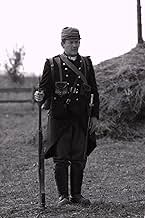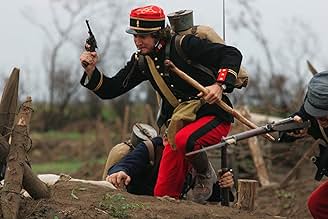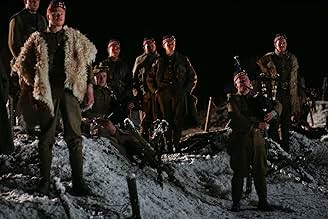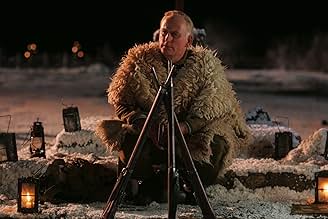En décembre 1914, pendant la Première Guerre mondiale, une trêve de Noël officieuse, sur le Front de l'Ouest, donne l'occasion à des soldats de camps opposés de découvrir le mode de vie des ... Tout lireEn décembre 1914, pendant la Première Guerre mondiale, une trêve de Noël officieuse, sur le Front de l'Ouest, donne l'occasion à des soldats de camps opposés de découvrir le mode de vie des uns et des autres.En décembre 1914, pendant la Première Guerre mondiale, une trêve de Noël officieuse, sur le Front de l'Ouest, donne l'occasion à des soldats de camps opposés de découvrir le mode de vie des uns et des autres.
- Nommé pour 1 oscar
- 6 victoires et 12 nominations au total
- Anna Sörensen
- (as Diane Krüger)
- Anna Sörensen
- (singing voice)
- Nikolaus Sprink
- (singing voice)
- (as Rolando Villazon)
Avis en vedette
Based on a true story, the film opens with the usual callous killing among three groups of soldiers - German, French, and Scottish - who face an oncoming Christmas Eve in the trenches, the realities of fighting have precluded their getting time to retreat for air. But a miracle happens: among the Germans is a famous opera tenor Nikolaus Sprink (Benno Fürmann) who has aligned with his fellow troops in the trenches, hoping he can bring some minor sense of Christmas and understanding to them. His soprano partner Anna Sorensen (Diane Kruger) finds a way to be with him in the trenches on Christmas Eve, 1914. Meanwhile the disgruntle troops of all three sectors are planning meager festivities and a bit of relaxation even in the trenches as the bodies of the day's plunder lie in the snow of no man's land. We get to know the French Lieutenant Audebert (Guillaume Canet) and his orderly Ponchel (Dany Boon), the German head of the regiment Horstmayer (Daniel Brühl), and the Scots - especially the priest/medic Palmer (Gary Lewis).
Christmas Eve comes and the voice of Sprink (in reality the tenor Rolando Villazón) sings 'Stille Nacht', rising out of the trenches to sing in the open of no man's land. Soon he is accompanied by the Scottish bagpipes and the 'chorus' of the Germans, the Scots and the French. They all emerge, share gifts of champagne and other libations, and agree to a cease-fire in honor of the holiday. It is in this magic moment that the true personalities of these warring men surface and each is seen as a vulnerable puppet of the WW I, exchanging addresses to meet after the war. Anna Sorenson has managed to enter the scene and during a communal mass led by Palmer she sings (the voice is Natalie Dessay) an Ave Maria (composed by the film's composer Philippe Rombi): the lovers have previously sung a duet version of Bach's 'Bist du bei mir'. For that moment in time the horrors of war melt and the camaraderie of the men glows and is carried into Christmas Day when all three groups of soldiers agree to bury their dead together. Of course the brutality and ignorance of war re-engages and the leaders of the three groups enter camp and threaten courts martial and punishment for the troops' lack of military discipline. The film ends in a manner that leaves the audience able to integrate the happenings of that Christmas Eve on the futures of these men.
The script is superb, the cast is uniformly excellent, the sets and cinematography are creatively moody, and the musical score by Philippe Rombi is one of the finest in years: the ending song 'I'm Dreaming of Home' deserves to become a standard. Would that everyone could see this film, a bit of global hope in the cloud of the destruction that shadows our world right now. Highly recommended. Grady Harp
By depicting the feelings and destinies of the soldiers, the film demonstrated the absurdity of war and how each soldier is more than a mere cannon target. It is a commentary on the utter stupidity of politics governing war events from behind curtains while not actually experiencing the real war. By depicting a unique event in European war history that occurred on Christmas day 1914 it shows viewers that Europeans can be as one even as "enemies".
About ten years ago I watched Paul McCartney's video "Pipes of Peace" and thought that what it depicted was completely fictitious--nothing more than pacifists' dreams. I have now learned that it was true.
Wow, what an amazing movie. As a rule I generally tend to blacklist war movies but this so different.
This is in no way about the glorification of war but instead tells a tale of a group of human beings that see past their differences for one night.
Apparently all based on true events known as the The Christmas Truce of 1914.
I highly recommend this movie to any and all.
The fact that the story is based on real events that happened shows that their is some good in humans across the world. In this story, all sides are respected as humans and the soldiers come to understand that under God, we are all one.
Please, even if you don't normally go to foreign language films or war movies, go to this film. The war scenes are not prolific. You will come out changed and smiling from the inside out!
Le saviez-vous
- AnecdotesThe character of the Male opera singer is based on that of German tenor Walter Kirchhoff (1879-1951), who traveled to the front in order to perform for the troops. His performance was met by cheers from the French lines, where upon he decided to climb onto no-mans-land to see who was cheering.
- GaffesWhen Anna and Nikolaus talks about the time they met for the first time, they say "Oslo". Oslo, capitol of Norway, was called Kristiania until 1924.
- Citations
Horstmayer: I heard last night about your wife. If you like, I can get a letter through to her.
Lieutenant Audebert: Why would you do that? If you got caught...
Horstmayer: [scoffs] One letter won't stop us winning the war. And anyhow, when we'll have taken Paris and it's over, you can invite us for a drink in Rue Vavin.
Lieutenant Audebert: You don't have to invade Paris to drop round for a drink.
- ConnexionsFeatured in Today: Episode dated 10 November 2005 (2005)
Meilleurs choix
Détails
- Date de sortie
- Pays d’origine
- Sites officiels
- Langues
- Aussi connu sous le nom de
- Noche de paz
- Lieux de tournage
- sociétés de production
- Consultez plus de crédits d'entreprise sur IMDbPro
Box-office
- Budget
- 18 151 814 € (estimation)
- Brut – États-Unis et Canada
- 1 054 361 $ US
- Brut – à l'échelle mondiale
- 17 709 155 $ US
- Durée1 heure 56 minutes
- Couleur
- Mixage
- Rapport de forme
- 2.35 : 1
Contribuer à cette page


![Regarder Bande-Annonce [VO]](https://m.media-amazon.com/images/M/MV5BY2UwMGZkODEtMTAzZi00NDVlLWI5YTktMjY1NTgyYmVlMWE2XkEyXkFqcGdeQXRodW1ibmFpbC1pbml0aWFsaXplcg@@._V1_QL75_UX500_CR0)






































